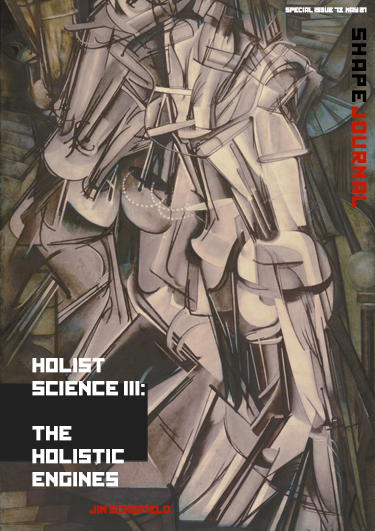
The Team
Jim Schofield - Author / Editor
Physicist, Philosopher, Marxist, Multimedia Expert, Mathematician, Author, Sculptor.
Dr. Peter Mothersole - Advisor / Editor
Senior Lecturer in Computing, Physicist, Photographer, Constructivist, Software Developer, Philosopher.
Dr. Mick Schofield - Art Director / Editor
Writer, Researcher, Photographer, Artist, Designer |
|
|
|
Special Issue 73
Holist Science III:
The Holist Engines
Round and Round the Garden Like a Teddy Bear
The Holistic Engines determining
both Persistence and Change
A Preliminary Review of Holistic Law
Read PDF (Right click link to Download)
Editorial
Welcome to Special Issue 73 of the SHAPE Journal.
This is the third edition in a new series on Holist Science, and how it must differ from Pluralist methodologies, if it is to truly revolutionise the discipline, and move it past its many current impasses.
The Holistic Engines examines how change happens in natural situations - how Science
fails to grasp dynamic causalities at multiple levels of Reality, and how it must now embrace a new augmented Dialectical Materialism, if it is going to begin to deal with Reality outside of its complete formalisation in Mathematics and Technology.
Art Director's note:
The importance of Abstraction to Holism and Dialectics, has been reflected visually, in the series thus far, through the use of Russian Constructivism as illustration, and the development of those ideas in proto graphic design and art from the Bauhaus.
However, what is missing from this influential Abstract art, is similar to what is missing from the Pluralist Abstraction that Schofield criticises in his Philosophy of Science. Both of these forms of Abstraction lack any real dynamic content, or the ability to represent change and evolution as we see it occuring in the Natural World. For this reason these Abstractions, while sometimes revealing, and formally very satifying, can sometimes seem lifeless and cold, or overly simplifying.
For this issue, which looks specifically at how Holistic Dialectics could address the real engines of change, we have looked to another, more dynamic form of Abstraction, and a key precursor to Constructivism, for many of the illustrations: Russian Futurism. Unlike Italian Futurism, which was closely related to Fascism at the time, the Russian version was primarily influeced by Cubism, and many of these Futurists went on to become part of the Bolshevik Revolutionary movement.
|
|
|
|




